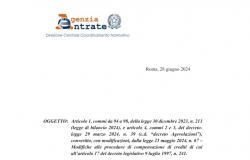Super bonuses and facade bonuses have created more costs than benefits for the GDP. The heavy burden on state coffers of housing subsidies is highlighted by a paper by researchers at the Bank of Italy which highlights the economic impact (environmental impact and savings were not assessed) of the two tax credits, called the «Facade Bonus» and the «Superbonus 110%», active in Italy since the second half of 2020. Via Nazionale has taken a snapshot of how much the public coffers has spent and what the positive return has been for the economy and for the construction sector buildings.
Two-year agreement: how it works, who must comply and the sanctions. The complete guide
VALUE ADDED
All things considered, the opinion of the researchers at Palazzo Kock is clear: «The benefits for the economy as a whole in terms of added value were lower than the costs incurred for the benefits» and the measure «does not pay for itself » but « creates further public debt for the new generations » which will have to be repaid in the future. The study compares the trend of spending on residential investments in Italy with that of other countries on the continent that had not used plans of the same type and highlights how “the fiscal multiplier” of the measure “was less than unity”.
The two measures, the central bank officials underline, have caused spending of more than 170 billion in the period 2021-23 (around 3% of GDP on average for the year). It is believed that an amount equal to a quarter of the expenditure relating to subsidized investments (above 45 billion) would have been carried out even in the absence of the incentives. With a share of 73% of the total value of investments in houses linked instead to tax credits. The “Facade Bonus” and the “Superbonus 110%” accounted for approximately 2.6-3.4 percentage points of the 13.5% growth in the construction sector between 2020 and 2023. There have been reactions to the whole affair.
THE AXE
Some party representatives also expressed their position. «Yet another merciless analysis of the damage caused to state coffers by the Superbonus comes from Bank of Italy. A disastrous measure wanted by the Pd and 5star government which cost 170 billion from 2021 to 2023 and which literally burned around three points of GDP per year”, said Augusta Montaruli, deputy group leader of the Brothers of Italy in the Chamber.
«The Superbonus is an ax on public finances and, if it had not been blocked, it would have created even greater damage to the state coffers with repercussions on the future, especially of our children. This is a fact that the Bank of Italy investigation certifies without leaving any doubt”, explained Fratelli d’Italia deputy Guerino Testa, secretary of the Finance Commission.
«It is sad to note for the umpteenth time that FdI parliamentarians pretend, or are not at all capable, of reading the economic dossiers. First point: the report that would certify an alleged failure of the Superbonus is not from Bank of Italy, but from three economists of our central bank who never talk about failure and who in any case, as expressly written in the document, express personal views that do not bind Palazzo Koch ». This was stated in a note by Senator Mario Turco, vice-president of the M5S and coordinator of the Five Star Economy, Work and Business Committee.
© ALL RIGHTS RESERVED
Read the full article at
The messenger





